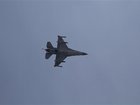On Taiwan's tiny Penghu islands, the missile bases that sit next to white-sand beaches and bustling fish markets are a visceral reminder of the constant threat of attack from China.
Despite the huge military discrepancy between the two sides, many analysts believe Taiwan's location, inhospitable terrain and US support mean China would find a full-scale invasion extremely hard -- and possibly too costly to countenance.
 Full Story
Full Story
Ukraine's request to join the European Union may advance Friday with a recommendation from the EU's executive arm that the war-torn country deserves to become a candidate for membership in the 27-nation bloc.
The European Commission's endorsement, while only a tentative step on a path that could take decades to complete, would send a strong symbol of solidarity with Ukraine and further test the EU's united front against Russia amid the invasion of its neighbor.
 Full Story
Full Story
In the video, a man stands in front of a blackboard in a full classroom, teaching the parts of an AK-47 rifle. He then hands it over to a boy, showing him how to cock it.
Other children crowd around, many who appear to be no older than 10, asking for their turn. The video, leaked online this month, provides a rare window into child soldier indoctrination by Yemen's Houthi rebels. Local residents confirmed to The Associated Press that it was filmed in recent weeks in Yemen's rebel-held province of Amran, northwest of the capital, Sanaa.
 Full Story
Full Story
Israel marked a major escalation in its years-long campaign of airstrikes in Syria, carrying out an attack last week that shut down the country's main civilian airport in Damascus as Israel steps up efforts to stop Iranian weapons shipments to Hezbollah.
Commercial flights were still halted at Damascus International Airport five days after Friday's pre-dawn airstrikes smashed into its runways, leaving multiple craters, and damaged the air control tower and other buildings.
 Full Story
Full Story
The European Union wants to strengthen its energy cooperation with Israel in light of Russia's use of gas supplies to "blackmail" its members over the Ukraine conflict, the European Commission chief said.
 Full Story
Full Story
Iran has started removing 27 surveillance cameras installed by U.N. inspectors at nuclear sites around the country, widening a dispute over Tehran's program as it enriches uranium closer than ever to weapons-grade levels.
Here's a timeline of the major events involving Iran's atomic program, which first came to the country under American aspirations of peaceful energy but later found itself the target of Western fears over the Islamic Republic's intentions.
 Full Story
Full Story
A study documenting at least 22,000 Israeli overflights in Lebanon’s skies over the past 15 years has revealed the “huge scale and impact of Israeli incursions over Lebanon” as well as the “psychological effect on the country,” British newspaper The Guardian reported on Thursday.
 Full Story
Full Story
Eight months after national elections, Iraq still doesn't have a government and there seems to be no clear way out of the dangerous deadlock.
Political elites are embroiled in cutthroat competition for power, even as the country faces growing challenges, including an impending food crisis resulting from severe drought and the war in Ukraine.
 Full Story
Full Story
With British Prime Minister Boris Johnson dealt a heavy blow after surviving a no-confidence vote from his own Conservative Party, questions already are being asked about who might succeed him if he was forced from office.
Conservative lawmakers voted 211-148 to keep Johnson as leader Monday following revelations that he and his staff held Downing Street parties that broke Britain's COVID-19 lockdown rules. But the scale of the revolt was considered more damaging than expected.
 Full Story
Full Story
Trucks loaded with humanitarian aid queue bumper-to-bumper amid the olive groves at the Turkish-Syrian border, waiting to be allowed across into war-torn Syria.
Inside are baby nappies and blankets, but also 15-kilo (33-pound) bags of flour, bulghur wheat, sugar, chickpeas and peanut-based pastes for children suffering from malnutrition.
 Full Story
Full Story



